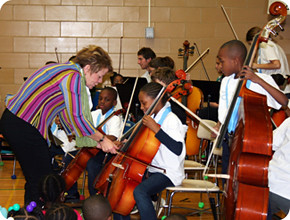“Some of your most gratifying musical experiences will be those that serve the greater good.”
–The Musician’s Way, p. 299
Whether we’re looking to raise money to support the likes of concert tours, local performances, or music education programs such as OrchKids, it can be challenging to identify funders and write effective grant proposals.
The following resources help grantseekers do both.
[Updated May 2022]
Resources to Find Grants & Learn Grant Writing Skills
For grant writing tips, start with my article, “How to Write a Grant Proposal – A Concise Guide.” Then, for more extensive guidelines, explore the Knowledge Base at Candid.org, where you’ll find a wealth of tutorials and examples.
- If you haven’t yet pinpointed your goals and financial needs, consider referring to the Introduction to Business Plans from the Mid Atlantic Arts Foundation.
Candid.org offers a wealth of additional free and low-cost resources such as searchable databases with in-depth information about funders.
- Note that many libraries provide free access to Candid.org premium resources.
The Grantsmanship Center features a free online Index of Funding Sources that supplies information about local, national, and international grantors. Using their interactive map, you can quickly pinpoint funders in particular regions.
Among local funders, community foundations often support arts and education projects as well advanced study, and the Council on Foundations in the U.S. publishes a helpful online Community Foundations Locator.
The Michigan State University Library has put together a valuable list of grant & grantwriting resources suited to diverse fields. Another free online directory of grant programs is the New York Foundation for the Arts Source, which compiles, “over 12,000 awards, services and publications for individual artists and art professionals.”
Guidestar (now part of Candid) offers a potent tool for discovering and learning about US nonprofit organizations, especially their financial statement known as the Form 990.
The National Endowment for the Arts (NEA) publishes a list of regional and state arts agencies in the U.S., most of which fund touring, arts-in-education programs, and so forth. For non-profit institutions (not individuals), there are numerous NEA-sponsored grant programs.
- To discover funding available from U.S. federal government entities, visit Grants.gov. Both domestic and overseas projects can receive support.
Many professional associations operate grant programs for their members, so it’s worth investigating the offerings from organizations in your specialty. For example:
- Chamber Music America sponsors grants in jazz and classical genres that help members pay for commissioning, presenting, and more.
- New Music USA oversees a number of innovative grant programs, many of them for composers.
Lastly, for crowdfunding tips and resources, see the Music Careers page at MusiciansWay.com.
To learn about new funding opportunities as they arise, subscribe to The Musician’s Way Newsletter. Need additional help to fund your projects? Contact me to discuss possible consulting.
Related posts
Boost Income and Impact with Local Sponsorships
Differentiate or Disappear
How to Write a Grant Proposal – A Concise Guide
Partnering with Non-Profits
What Makes an Entrepreneurial Musician?
© 2012 Gerald Klickstein
Updated May 2022


